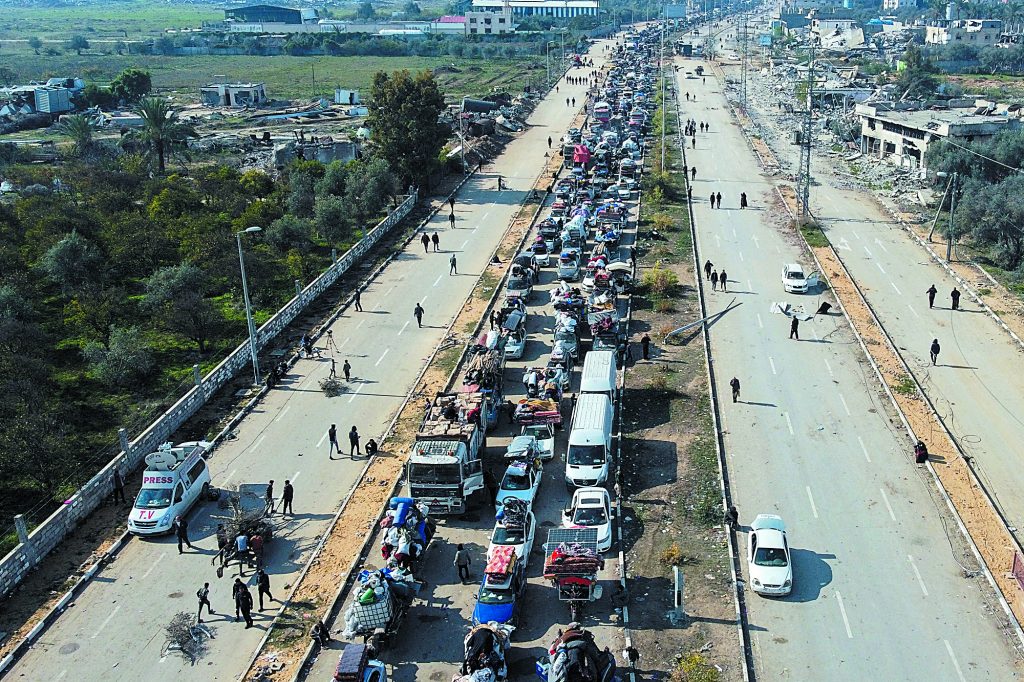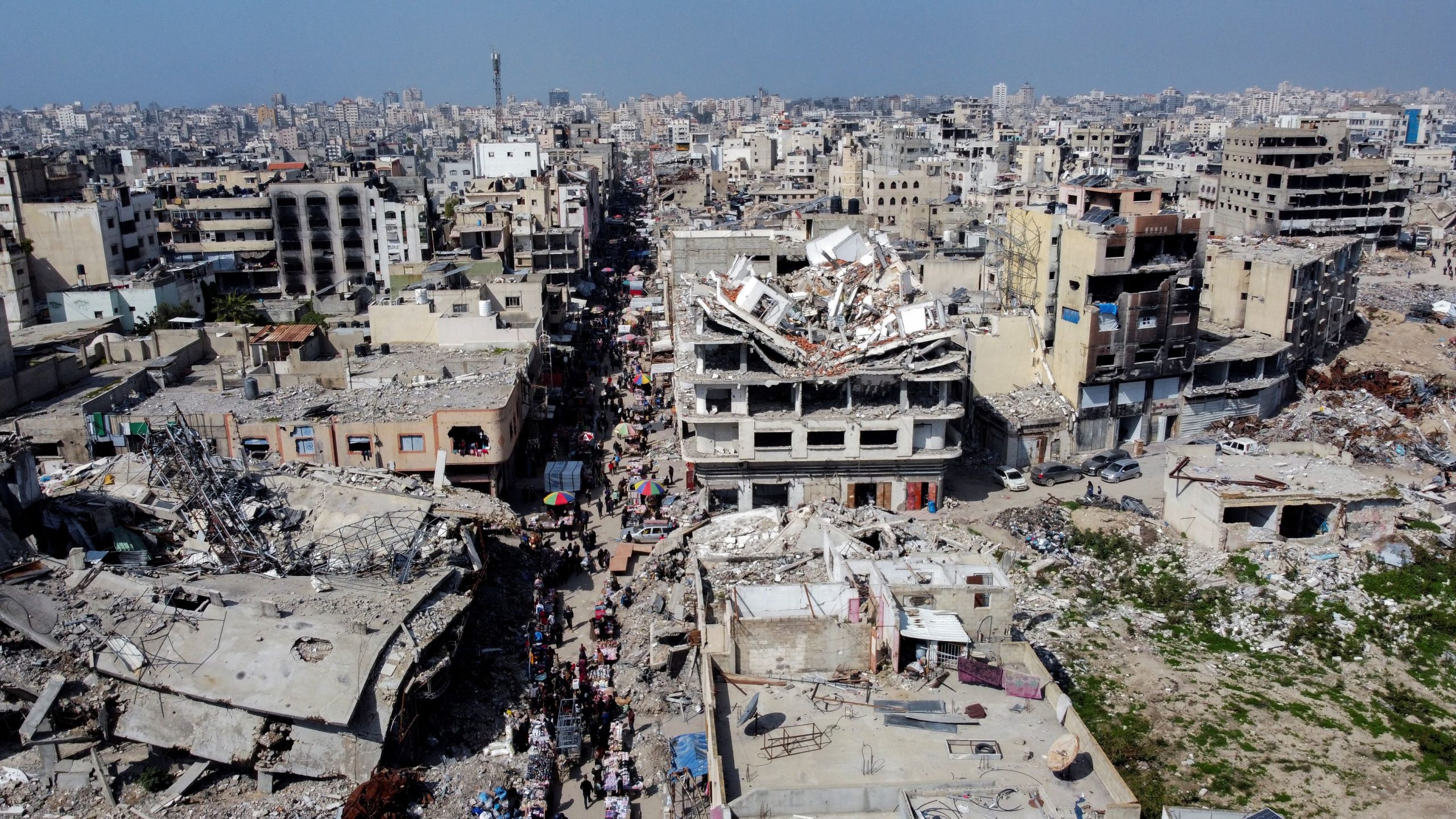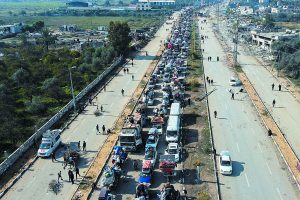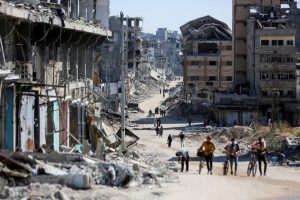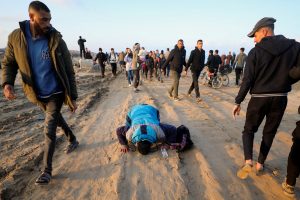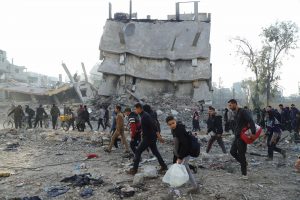President Trump wants the U.S. to control the Gaza Strip , but it isn’t even clear who owns it. Determining that might be among the most complicated territorial questions on Earth.
The Palestinian enclave has an almost unique status, as well as a long history of changing hands, which makes figuring out who ultimately owns the tiny territory a matter of unpacking overlapping land laws laid down over centuries.
Who controls Gaza now?
Gaza is effectively run by Hamas militants , but the United Nations says it is unlawfully occupied by Israel. Most countries consider the war-torn Strip part of Palestine, which itself isn’t recognized as a state by the U.S., among others.
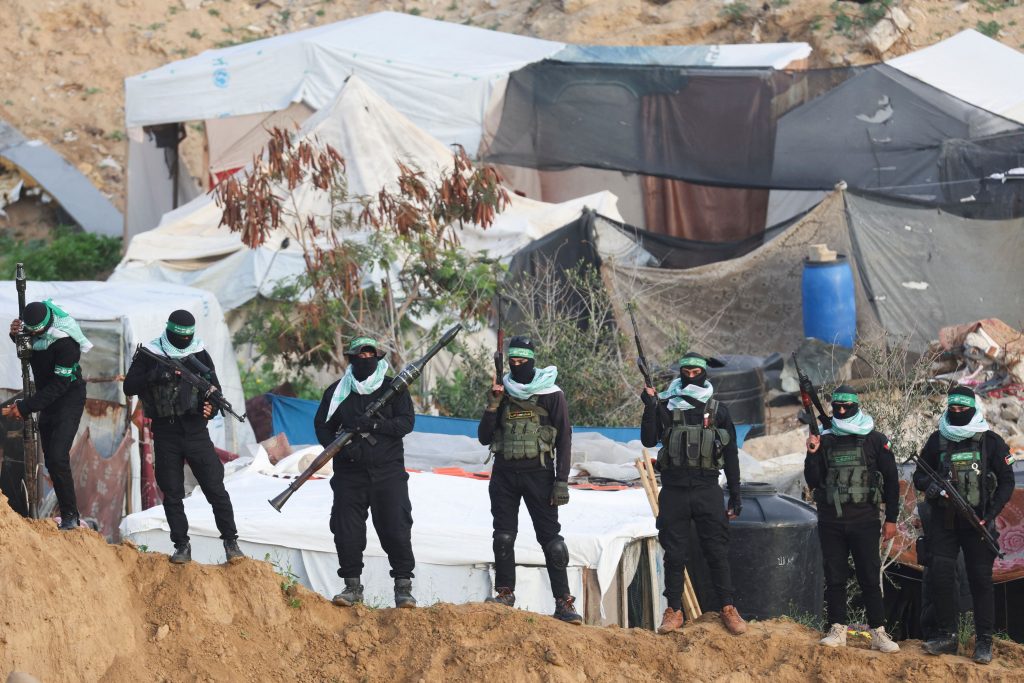
Palestinian Hamas militants keep guard on the day Hamas hands over deceased hostages Oded Lifschitz, Shiri Bibas and her two children Kfir and Ariel Bibas, seized during the deadly October 7, 2023 attack, to the Red Cross, as part of a ceasefire and hostages-prisoners swap deal between Hamas and Israel, in Khan Younis in the southern Gaza Strip February 20, 2025. REUTERS/Ramadan Abed
Israeli Prime Minister Benjamin Netanyahu has said Israel doesn’t want to occupy Gaza at the end of the war, and he has praised Trump for what he said was creative thinking in proposing to relocate Palestinians from the Strip, something the U.N. has warned could contravene international law.
How would Trump take over?
Trump has offered few concrete details about his plans for Gaza, beyond saying the U.S. would invoke “United States authority” to control it. He has said that the U.S. wouldn’t buy Gaza or use American troops to take it, but that the U.S. should have long-term control to turn the Philadelphia-size territory into the “Riviera of the Middle East.”
The nearly two million Palestinians living in Gaza would relocate to Jordan and Egypt in Trump’s vision. He has threatened to withhold aid from those countries if they refuse to take the displaced people, though he has since said such freezes wouldn’t be necessary.
The plan has been denounced by Arab states including Saudi Arabia, and European allies of the U.S. have said they don’t support it. The Palestinian Authority, which ruled Gaza before Hamas, has said Trump’s proposal for Gaza represents a violation of international law and has pledged that Palestinians won’t relinquish their goal of a Palestinian state.
Hamas has vowed to fight Israel until the establishment of a Palestinian state that includes the Strip. Regular Gazans, most descended from Palestinians who were moved in 1948 from land that is now Israel, have pledged to stay put.
“Gaza was under the Palestinian Authority until it was taken by force by Hamas,” said Yossi Beilin , who helped craft the Oslo Accords that created the Palestinian Authority that ruled Gaza until Hamas seized power in 2007. Should Trump want to legally take control of Gaza, “he has to talk to the PA,” Beilin said.
Who owns the land in Gaza?
Because Gaza has changed hands so often, the legal framework governing individual ownership of the land is a knot of British, Egyptian and Palestinian laws. Some rules even date to when the area was under the control of the Ottoman Empire during the 400 years leading up to World War I.
Private individuals own as much as half of the land in Gaza, which can be freely bought or sold, according to a 2015 study of land ownership in the enclave by the Norwegian Refugee Council.
But more than one-third of that land is estimated to be unregistered because of difficulties, including establishing what is called a chain of ownership, and complex land laws and registration procedures, according to the study. Some owners in the past didn’t register land to avoid paying tax, it said.
Unregistered private land can be registered by the owners only if they are able to prove a historical chain of ownership. If not, owners are subject to restrictions: They can sell the land, but can’t mortgage it, for example. Unregistered land owners are considered the owners unless proven otherwise, the study said.
Deeds of ownership have in the past been required to build in Gaza, where about one-third of the territory is considered land for public use, though that is often occupied by private individuals, the study said.
Before the recent war, plots of land in Gaza were registered with the Palestinian Land Authority and taxed by the Property Tax Directorate in Gaza’s Finance Ministry.
Palestinian refugees who fled the 1948 Arab-Israeli war that created the state of Israel also reside in eight refugee camps that have since become permanent townships, where residents informally exchange ownership of property. A small part of Gaza is allocated as an Islamic endowment for religious purposes.
Isn’t most of Gaza under rubble now?
Estimates vary, but the U.N. says about 70% of the structures in Gaza are either destroyed or damaged, including more than 245,000 housing units. Entire city blocks are flattened and Palestinians say their neighborhoods are unrecognizable, making working out who owns what and where even more challenging.
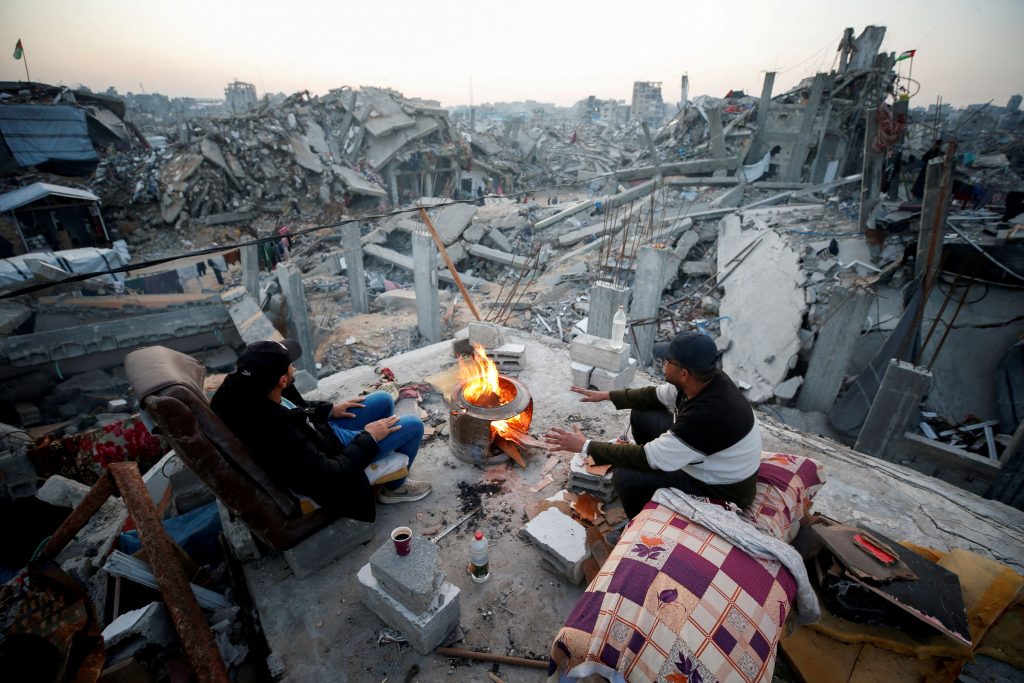
Palestinians sit next to a fire among the rubble of buildings destroyed during the Israeli offensive, amid a ceasefire between Israel and Hamas, at Jabalia refugee camp, northern Gaza Strip, February 17, 2025. REUTERS/Mahmoud Issa TPX IMAGES OF THE DAY REFILE – CORRECTING FROM “AMONG RUBBLE OF DESTROYED BUILDINGS DURING THE ISRAELI OFFENSIVE” TO “AMONG THE RUBBLE OF BUILDINGS DESTROYED DURING THE ISRAELI OFFENSIVE”.
About 50 million tons of debris created during months of bombing are expected to take more than a decade to remove, and experts say it will take tens of billions of dollars to rebuild Gaza. The rubble also sits on top of hundreds of miles of Hamas-built tunnels that the Israeli military has tried to destroy, leaving a fragile demolition site both above and below ground.
What do international treaties say?
The U.N. says international law generally prohibits the forced displacement of people from land, but exceptions can be made for national security or public-order reasons, according to the U.N. High Commissioner for Refugees. In those instances, the U.N. says, the people affected should be given the opportunity to challenge the decision and provide their consent. “Displacement should never be carried out in a manner that violates the rights to life, dignity, liberty and security of those affected,” according to the UNHCR.
Write to Rory Jones at Rory.Jones@wsj.com
